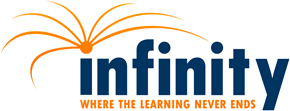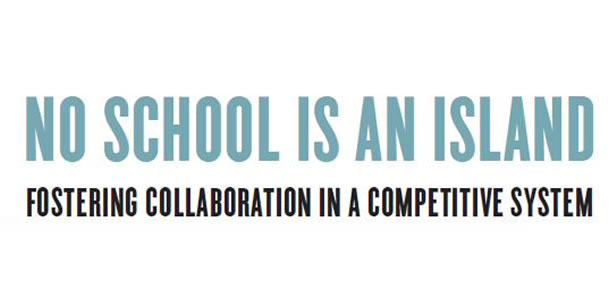No School is an Island
“No School is an Island Fostering Collaboration in a Competitive System” Rose Paterson (The New Zealand Initiative)
No School is an Island is the story of a New Zealand model of this kind called Learning and Change Networks (LCN), where schools have banded together as networks to collaborate with each other.
[The LCN strategy] is an innovation in its true sense of the word and off the scale in comparison to what is happening around the world.
— Valerie Hannon, Director, Innovation Unit, London
The following are some quotes we might want to put on facebook, tweet, or on homepage, or in case study re LCN. Or quotes about our facilitation.
Link to online article. http://nzinitiative.org.nz/About+Us/Staff/Rose+Patterson/Rose+Patterson+Publications.html?uid=717
“There is a philosophy behind the LCN strategy that schools own and drive their own change. It is a flexible, self-learning strategy, rather than one with hard-and-fast bureaucratic rules. The facilitators who work with each LCN are skilled at adapting their level of support to the needs of the network. They encourage students, families/whānau, teachers and school leaders to work together to identify the achievement challenge they need to work on and they dig deep to ask what needs to change to address that challenge.”
“The key features of the LCN strategy that seem to lead to success. First, as already mentioned, the LCN strategy represents an appropriate balance of structure and freedom – a ‘light touch’ bureaucracy – and facilitators adjust the amount of support they provide to each network over time. With time, internal capacity within each LCN increases”
“each student is considered the centre of their own network of learning, which recognises that learning happens beyond classroom walls and outside of school time and is facilitated by many people, not just teachers. It attempts to authentically engage the people in children’s lives who can help to enhance their learning opportunities. This is a positive model given the importance of engaging parents with the education system, and given that family background is even more of an influence on student learning than teachers are.”
“LCN is one strategy to encourage this collaboration in a way that continues to respect New Zealand schools’ autonomy. Rather than a top-down model of change, facilitators help build connections between schools and with the wider community of people (families and whānau) who can enhance learning opportunities for students.”
“LCN is more holistic, recognising that children learn all the time, in all places, and from all people. Learning is not limited to four classroom walls and between school bells. The network of people in a student’s life can come together to enhance learning opportunities.”
The LCN facilitation team and the school networks themselves are continually learning about what works, and the process is flexible and adaptive enough to respond to local contexts.
“Some people figure out who are the enthusiastic students and start with them. It’s important to start with the interest, and grow energy around that interest”.18 In the fourth phase, LCNs embed new, effective practices in a sustainable way while eradicating things that don’t work.
LCN facilitators float across a continuum of structure and freedom, depending on how much support schools need and ask for. Facilitators have a strong philosophy of letting schools do it for themselves, rather than imposing a by-design top-down approach from the Ministry.
The facilitator is not an external expert bringing in knowledge; rather, they’re walking alongside participants to pull the knowledge out of the group and grow confidence that the group already has much of the knowledge necessary to address the achievement challenge. If they can’t find the knowledge within the group, they can find it beyond the group, such as from other groups or on the Internet, or they have to face up to constructing new knowledge if it does not exist.1
When we first started LCN, we thought it was about moving from teacher-directed to student-directed learning, but in actual fact that’s not true. All of us sometimes need to be told what to do – sometimes it is best for students and adults to co-construct learning, and at other times, students are best placed to self-direct their learning. It is a matter of students and adults negotiating with one another about which arrangements are best.
The facilitator’s role is to support the network to encourage schools to engage with their families in an authentic way – to listen and respond to the parents rather than consult or tell the parents what they think parents need to know.
The importance of the facilitation process adapting to the local context is particularly important in New Zealand’s self-managing school system.
One of the most striking features of LCN is how facilitators cross-pollinate knowledge from network to network in a way that activates “lateral learning within and between LCN networks… new networks benefit from cutting-edge facilitation based on learning from the other networking arrangements”.
RECOMMENDATION 1: Provide additional operation funding first, and encourage schools to use it to contract facilitation support
Before advertising and filling the new teacher roles in a Community of Schools, it is essential that Communities of Schools first undergo a development period of working together and establishing trust, relationships and a common vision, as well as a shared achievement challenge, using the additional operational funding of around $12,000 per community per year. Once a Community of Schools has registered as a Community, it should receive this additional funding. This funding should be used for this purpose prior to advertising and filling the new roles. Some networks of schools under the current LCN umbrella may, however, be further along in their development and could access funding for the new roles quite quickly. Policy settings must ensure that this is adaptable to the needs of each Community of Schools.
At least for the first tranche of Communities of Schools signing up, communities could be encouraged (but not forced) to contract the LCN team at the University of Auckland or other potential providers with appropriate facilitation experience, should they wish to access it during the development period. This would have several benefits:
It would provide an impartial external facilitator before formal leadership (the Community Leader) is established. This may ease initial tensions as schools in the community build trust and relationships. External facilitators would bring knowledge of how to build trust and encourage collaboration within a competitive model.
Facilitators would bring extensive experience in supporting networks of schools in a way that builds capacity. When facilitation support is eventually phased out, facilitators would leave, but their knowledge and skills would remain with the school communities.
Using current LCN facilitators would provide the right mix of challenge and support without being top down or managerial. They also act as role models for effective leadership to potential leaders within Communities of Schools.
Depending on the stage at which people are selected for the new roles in a Community of Schools, the process of working together as a Community to identify the shared achievement challenge would allow natural leaders to emerge, helping teachers identify whether they would like to apply for the new roles and also helping school leaders identify potential talent. In a survey of 27 LCN networks, 20 described how distributive leadership was emerging in their schools.
The networks included comments about increased role differentiation, instances of leaders mentoring newer or less involved leaders… and “networks found that some people merged as leaders unexpectedly”.104
Facilitators could provide moral support and scaffolding to Community Leaders. The facilitators interviewed for this report were ex-principals now highly experienced in working with multiple networks across the country. Communities can tap into the vast knowledge of facilitators to develop the capability of their Community Leaders.
It could build on the LCN process of working with students, whānau and the wider community to identify the achievement challenge and the changes needed to raise student achievement. Facilitators could cross-pollinate their knowledge of what other networks have done to genuinely involve parents and whānau in their children’s learning and enable students to build their own agency for learning.
As more Communities of Schools come on board, Community Leaders could become facilitators in other communities just starting up – representing another step in the career pathway for later consideration.
Click here for article



